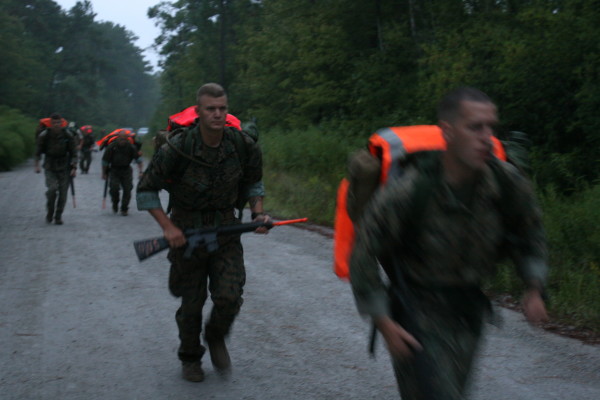

Occasionally, someone will ask me for advice on how to pass the United States Marine Corps Special Operations Command assessment and selection course, the first step to become a MARSOC Raider, which I did in 2008. These days there is no shortage of reading out there espousing what workouts one should do in preparation to become a member of Special Operations. Fear not, for I will not bore you with another calisthenic/Crossfit/SEALfit/bullshit routine, nor provide false tips on how to save your knees from the countless miles you should be spending with a pack on your back.
RELATED: This Marine is about to run 161 miles in honor of fallen servicewomen »
My answer to how to prepare for MARSOC training isn’t actually even about the physical — it’s all about the mental. Those legendary intangibles, the all too often glossed-over qualities required in special operations are the most important. So here is what it takes:
1. Show up. First and foremost you have to show up. If every operator had a nickel for every time someone told them about the time they thought about going to selection, but didn’t for some bullshit reason, SOCOM wouldn’t need re-enlistment bonuses. The reality is most people talk themselves out of attending selection before they even start. This self-selection is probably the most important part of the process. To those would-be operators out there: fuck what everyone else says, show up.
2. Don’t Quit. Once you have passed that first step, remember one thing — don’t quit, ever. Not for a little bit, not cause your feet hurt, not because you’ve got broken bones. Not quitting is the single most important quality in any operator. Assessment and selection is designed to answer one question — are you a quitter? This fundamental question needs to be answered before any special operation command can invest any resources in training you.
The beauty of Assessment and Selection is that you can drop on request at any time. The course is designed to make you want to quit. The formula is simple. How much stupid, painful, ridiculous, seemingly useless shit can I ask you to do before you will give up? A friend of mine used to always say, “We’re not particularly smarter or stronger. We’re just the idiots who don’t know when to say enough.” Indeed, most rational people wouldn’t cover over 20 kilometers of land navigation in a day or push a broken jeep across a map, just because they were asked. Most people wouldn’t march with a pack in the pitch dark of night, not knowing where they were going, or when they would get there, with no track of time and no communication, all while being evaluated on unknown criteria. But, that is why most people are not special operators.
Why do we care if you’re a quitter? Operators are thrust into daunting and unforgiving challenges in harsh and ambiguous environments. When a team of less than 15 operators is leading 100 panicky Afghan commandos into a hostile village assault, you want to be sure that none of those operators are going to quit on you. In this regard, assessment and selection is the perfect tool for separating the mentally strong and willing, from the unworthy.
3. Adapt. Although torturous, assessment and selection is not completely arbitrary. Why would they require people to complete impossible challenges with inadequate resources and insufficient time? Because, that is the life of a special operator. Why would they create difficult situations surrounded in ambiguity in a team environment? Because they need to know how you’ll function under the most stressful of circumstances down range.
Commanders love special operators because they are good at mission accomplishment, whatever the mission may be. Adaptability is the name of the game, not just to the situation on the ground but having the capacity to do it all. Teams function on a concept of redundancy. Everyone needs to know everyone else’s job, understanding that at any given point someone can be taken out of the fight. Those situations are never accommodating, in fact, those situations always seem to be the worst-case scenarios. A well-functioning team will always accomplish the mission, regardless of setbacks, because everyone in the stack can adapt and do the job of the man who went down.
In summary: show up, don’t quit, adapt, and you are well on your way to becoming a pipe hitter.
And if all that fails always remember to follow the Recon rules: 1. Always look cool, 2. Never get lost, 3. When in violation of rule 2, follow rule 1.
